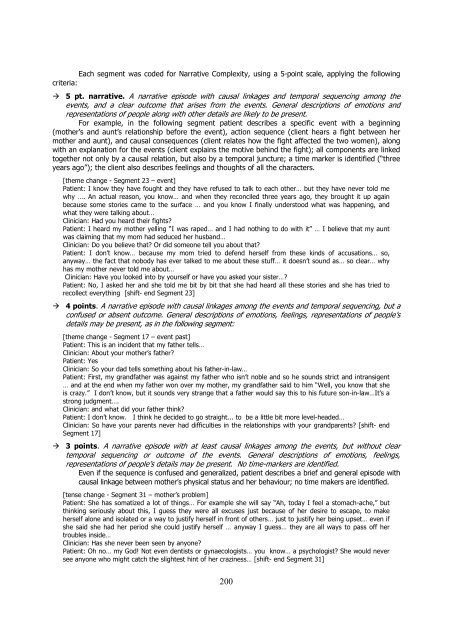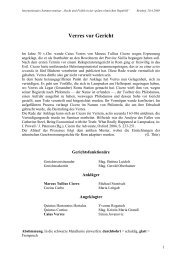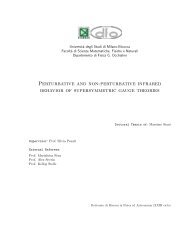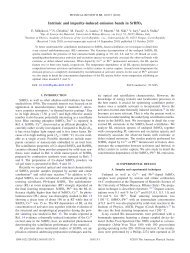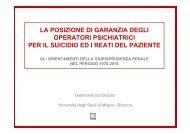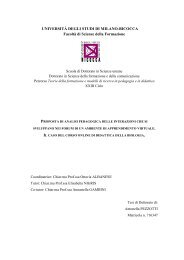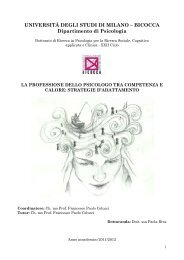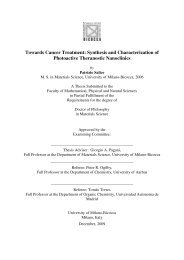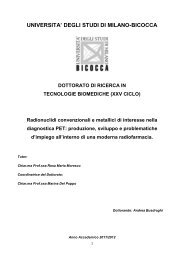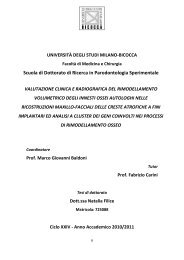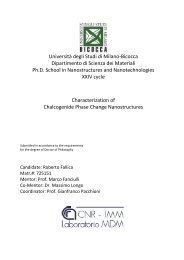LA NARRAZIONE AUTOBIOGRAFICA E IL FUNZIONAMENTO DEL SÉ
LA NARRAZIONE AUTOBIOGRAFICA E IL FUNZIONAMENTO DEL SÉ
LA NARRAZIONE AUTOBIOGRAFICA E IL FUNZIONAMENTO DEL SÉ
Create successful ePaper yourself
Turn your PDF publications into a flip-book with our unique Google optimized e-Paper software.
Each segment was coded for Narrative Complexity, using a 5-point scale, applying the following<br />
criteria:<br />
� 5 pt. narrative. A narrative episode with causal linkages and temporal sequencing among the<br />
events, and a clear outcome that arises from the events. General descriptions of emotions and<br />
representations of people along with other details are likely to be present.<br />
For example, in the following segment patient describes a specific event with a beginning<br />
(mother’s and aunt’s relationship before the event), action sequence (client hears a fight between her<br />
mother and aunt), and causal consequences (client relates how the fight affected the two women), along<br />
with an explanation for the events (client explains the motive behind the fight); all components are linked<br />
together not only by a causal relation, but also by a temporal juncture; a time marker is identified (“three<br />
years ago”); the client also describes feelings and thoughts of all the characters.<br />
[theme change - Segment 23 – event]<br />
Patient: I know they have fought and they have refused to talk to each other… but they have never told me<br />
why …. An actual reason, you know… and when they reconciled three years ago, they brought it up again<br />
because some stories came to the surface … and you know I finally understood what was happening, and<br />
what they were talking about…<br />
Clinician: Had you heard their fights?<br />
Patient: I heard my mother yelling “I was raped… and I had nothing to do with it” … I believe that my aunt<br />
was claiming that my mom had seduced her husband…<br />
Clinician: Do you believe that? Or did someone tell you about that?<br />
Patient: I don’t know… because my mom tried to defend herself from these kinds of accusations… so,<br />
anyway… the fact that nobody has ever talked to me about these stuff… it doesn’t sound as… so clear… why<br />
has my mother never told me about…<br />
Clinician: Have you looked into by yourself or have you asked your sister…?<br />
Patient: No, I asked her and she told me bit by bit that she had heard all these stories and she has tried to<br />
recollect everything [shift- end Segment 23]<br />
� 4 points. A narrative episode with causal linkages among the events and temporal sequencing, but a<br />
confused or absent outcome. General descriptions of emotions, feelings, representations of people’s<br />
details may be present, as in the following segment:<br />
[theme change - Segment 17 – event past]<br />
Patient: This is an incident that my father tells…<br />
Clinician: About your mother’s father?<br />
Patient: Yes<br />
Clinician: So your dad tells something about his father-in-law…<br />
Patient: First, my grandfather was against my father who isn’t noble and so he sounds strict and intransigent<br />
… and at the end when my father won over my mother, my grandfather said to him “Well, you know that she<br />
is crazy.” I don’t know, but it sounds very strange that a father would say this to his future son-in-law…It’s a<br />
strong judgment….<br />
Clinician: and what did your father think?<br />
Patient: I don’t know. I think he decided to go straight... to be a little bit more level-headed…<br />
Clinician: So have your parents never had difficulties in the relationships with your grandparents? [shift- end<br />
Segment 17]<br />
� 3 points. A narrative episode with at least causal linkages among the events, but without clear<br />
temporal sequencing or outcome of the events. General descriptions of emotions, feelings,<br />
representations of people’s details may be present. No time-markers are identified.<br />
Even if the sequence is confused and generalized, patient describes a brief and general episode with<br />
causal linkage between mother’s physical status and her behaviour; no time makers are identified.<br />
[tense change - Segment 31 – mother’s problem]<br />
Patient: She has somatized a lot of things… For example she will say “Ah, today I feel a stomach-ache,” but<br />
thinking seriously about this, I guess they were all excuses just because of her desire to escape, to make<br />
herself alone and isolated or a way to justify herself in front of others… just to justify her being upset… even if<br />
she said she had her period she could justify herself … anyway I guess… they are all ways to pass off her<br />
troubles inside…<br />
Clinician: Has she never been seen by anyone?<br />
Patient: Oh no… my God! Not even dentists or gynaecologists… you know… a psychologist? She would never<br />
see anyone who might catch the slightest hint of her craziness… [shift- end Segment 31]<br />
200


